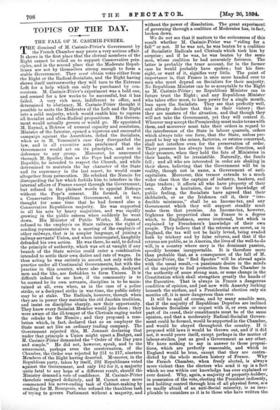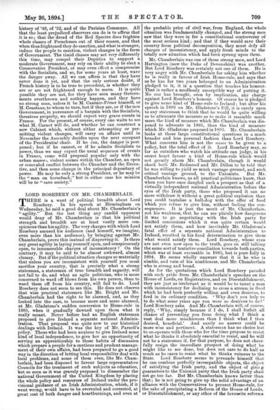TOPICS OF THE DAY.
THE FALL OF M. CASIMIR-PRRIER. THE dismissal of M. Casimir-Prier's Government by the French Chamber may prove a very serious affair. It shows in the first place that the clerical members of the Right cannot be relied on to support Conservative prin- ciples, and in the second place that the Moderate Repub- licans are not by themselves strong enough to form a stable Government. They must obtain votes either from the Right or the Radical-Socialists, and the Right having shown itself untrustworthy they will turn to the Extreme Left for a help which can only be purchased by con- cessions. M. Casimir-Perier's experiment was a bold one, and seemed for a few weeks to be successful, but it has failed. A very rich man, indifferent to office, and determined to obstinacy, M. Casimir-Wrier thought it possible to unite the Moderates of the Left and the Right into a solid majority, which would enable him to repress all Socialist and ultra-Radical propositions. His Govern- ment would actually govern or would go. He appointed M. Raynal, a Hebrew of unusual capacity and resolution, Minister of the Interior, opened a vigorous and successful campaign against the Anarchists, defied the Socialists, when as in M. Toussaint's case they disregarded the law, and in all executive acts proclaimed that the Government would act on its principles, and. not in deference to any group. Moreover, he announced through M. Spuller, that as the Pope bad accepted the Republic, he intended to respect the Church, and while determined to maintain the lay character of the State and its supremacy in the last resort, he would cease altogether from persecution. He rebuked the Nuncio for disregarding the law which forbids him to interfere in the internal affairs of France except through the Government, but refused in the plainest words to appoint Bishops without the Pope's consent. He formed, in fact, a Conservative Republican Government, and it was thought for some time that he had formed also a Conservative Republican majority. He was supported in all his acts by heavy majorities, and was rapidly growing in the public esteem when suddenly he went down. His Minister of Public Works, M. Jonnart, refused to the employes on State railways the right of sending representatives to a meeting of the employes of other railways, that is in simpler language, of joining a railway-servants' Union, and when interrogated, haughtily defended his own action. He was there, he said, to defend the principle of authority, which was set at naught if any branch of the State service could enter a combination intended to settle their own duties and rate of wages. In thus acting he was entirely in accord, not only with the practice under all Continental Governments, but with the practice in this country, where also postmen, dockyard men and the like, are forbidden to form Unions. It is difficult indeed to see how, if the community is to be coerced by its own servants, discipline is to be main- tained at all, even when, as in the case of a police strike, or a dockyard strike in war-time, the public safety may be at stake. The Radicals, however, though when they are in power they maintain the old Jacobin tradition, and insist on discipline sharply, saw their opportunity. They knew every Socialist Member would join them ; they were aware of the ill-temper of the Clericals raging under the rebuke to the Nuncio ; and they proposed a reso- lution which, in fact, declared that as an employer the State must act like an ordinary trading company. The Government rejected this, M. Jonnart declaring that under that principle a Union might upset a Budget, and M. Casimir-Wrier demanded the "Order of the Day pure and simple." He did not, however, speak, and to the amazement, perhaps even the consternation, of the Chamber, the Order was rejected by 251 to 217, nineteen Members of the Right having deserted. Moreover, in the Republican party, taken by itself, 232 Republicans voted against the Government, and only 182 for it, a majority quite fatal to any hope of a different result, should the Ministry demand a vote of confidence. M. Casimir-Perier therefore resigned definitely, and M. Carnot once more commenced his never-ending task of Cabinet-making by sending for M. Bourgeois, who refused the thankless task of trying to govern Parliament without a majority, and without the power of dissolution. The great experiment, of governing through a coalition of Moderates has, in fact,, broken down.
We do not see that it matters to the seriousness of this result whether M. Casimir-Wrier was "riding for a fall" or not. If he was not, he was beaten by a coalition of Socialistic Radicals and Clericals which took him by surprise ; and if he was, he was beaten by the same men, whose coalition he had accurately foreseen. The latter is probably the truer account, for in the former case he would probably have spoken ; but his fore- sight, or want of it, signifies very little. The point of importance is, that France is once more handed over to men who must depend on Socialists for their majority. No Republican Minister can be so acceptable to the Right as M. Casimir-Wrier; no Republican Minister can in future trust the Right ; and any Republican Minister who takes office must, to keep power for a single month, lean upon the Socialists. They see that perfectly well, and already declare that this is their victory ; that they are masters of the situation, and that though they will not take the Government, yet they will control it Whoever may accept the Premiership must make terms with them, and moreover must take their orders in regard to. the interference of the State in labour quarrels, orders which always take one form, that the State, unless pre- pared to buy up the mines, factories, or estates concerned, shall not interfere even for the preservation of order. Their pressure has always been in that direction, and. their pressure, when they hold the fate of Ministries in their hands, will be irresistible. Naturally, the funds fell ; and all who are interested in order are shaking in. their shoes, believing that the Government will be in reality, though not in name, a Government of anti- capitalists. Moreover, this tremor extends to a much wider class than the captains of industry, bankers, and large traders ; it affects all who have property of their own. After a hesitation, due to their knowledge of public feeling, the Socialists have agreed that their shibboleth, or as the Irishmen call it, their "irre- ducible minimum," shall be an Income-tax, and any Government which they will support steadily must make them that promise. An Income-tax, however, frightens the propertied class in France to a degree which, to Englishmen, seems irrational, but which is explained by Frenchmen's knowledge of their own people. They believe that if the returns are secret, as in England, the tax will not be fairly levied, being evaded both by trickery and by false returns, and that if the returns are public, as in America, the lives of the well-to-do will, in a country where envy is the dominant passion, speedily become insupportable. It is therefore more than probable that, as a consequence of the fall of M. Casimir-Perier, the "Red Spectre" will be abroad again with the usual result,—a passionate desire in the minds of the majority to find protection from the Chamber in the authority of some strong man, or some change in the Constitution which shall strengthen greatly the hands of the Executive. That is always in France a dangerous condition of opinion, and just now with Anarchy lurking beneath the surface, and a Presidential election only six months off, it is more dangerous than ever.
It will be said of course, and by many sensible men, that if the majority of Republican Deputies are inclined to tolerate Socialism or coquet with it, or even embrace part of its creed, their constituents must be of the same opinion, and that a moderately Radical-Socialist Govern- ment could be formed, would be supported in the Chamber, and would be obeyed throughout the country. If it proposed wild laws it would be thrown out, and if it did not, it would prove itself, except perhaps in the matter of labour-strikes, just as good a Government as any other. We have nothing to say in answer to those proposi- tions, which are perfectly reasonable, and which in England would be true, except that they are contra- dicted by the whole modern history of France. Why the French Chamber, when freely elected, is always more violent than the electors who send it up is a fact which no one within our knowledge has ever explained or ever denied. Why, again, a majority of property-holders, in possession of the vote, electing the President indirectly, and holding control through him of all physical force, at e so madly afraid of an anti-Social minority, is as inex- plicable to outsiders as it is to those who have written the history of '48, of '52, and of the Parisian Commune. All that the least prejudiced observers can do is to affirm that it is so ; that the dread of the Red Spectre does frighten whole classes of Frenchmen out of their reason, and that when thus frightened they do sanction, and what is stranger, induce the people to sanction, violent changes in the form of Government. The timid classes may act very differently this time, may compel their Deputies to support a moderate Government, may rely on their ability to elect a Conservative President, or may even effect a compromise with the Socialists, and so, for some years at least, wave the danger away. All we can affirm is that they have never done it yet, and that the only serious doubt, if French history is to be true to precedent, is whether they are or are not frightened enough to move. It is quite possible they are not, for they have seen many Govern- ments overthrown and nothing happen, and they have no strong man, unless it be M. Casimir-Perier himself, or M. Constans, to whom to turn, but if they are, or if the new Government, in pursuance of a bargain with the Socialists, threatens property, we should expect very grave events in France. For the present, of course, every one waits to see what M. Carnot will do, and whether he can construct a new Cabinet which, without either attempting or per- mitting violent changes, will carry on affairs until in November the Assembly decides upon the next occupant of the Presidential chair. If he can, the danger is post- poned; but if he cannot, or if he admits Socialists to power, than we may expect the usual sequence of events in France, some wild proposal popular only with the urban masse, violent scenes within the Chamber, an open or concealed conflict between the Chamber and the Execu- tive, and then some change in the principal depositary of power. He may be only a strong President, or he may be the "man on horseback," but in either case his mission will be to "save society."



































 Previous page
Previous page